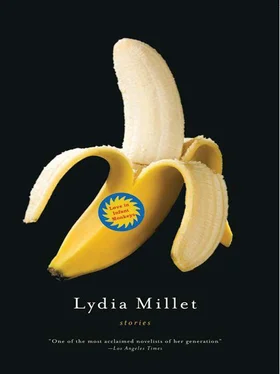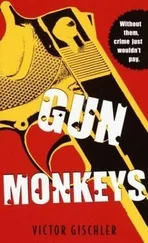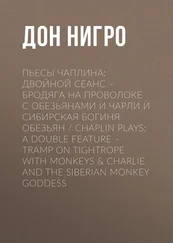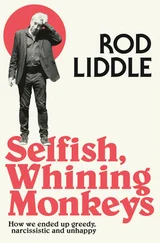Adamson, squatting in the bushes, stayed put. His body was still but his mind worked hard, puzzling. He considered giraffes. Terence had a weakness for elephants; himself, he was strictly a lion man. But giraffes, though morphological freaks, had never interested either of them. Artiodactyla, for one thing: the order of camel, swine and bovids. Not suited for long-term relationships. Strictly for riding, eating or milking, really. He pitied them, but not much. There were no refrigerators in nature, after all; meat and milk had to keep themselves fresh.
After years in the bush he saw all animals as predators or prey. The tourists that came through his camp wanting to pet the lions? Now those were strictly prey, he mused.
Then, recalled to the present after a pause: No offense.
None taken, said the German heartily.
In fact the German had felt a prickle of annoyance. The flight in, on a single-engine Cessna in jolting turbulence, had made him squeeze his eyes shut and pray silently to a God in whom he did not believe. For this?
An old alcoholic, he thought angrily, with poor hygiene — that was all. He had been eight years of age when he saw Born Free , living in a claustrophobic bourgeois household in Stuttgart. His father was fat as blood sausage and his mother used a bottle of hairspray a week. He thought Adamson and his beautiful wife were like Tarzan and Jane.
But Kirsten had disapproved of this trip, and she was probably right: nothing more than a midlife crisis.
The smoke from Adamson’s pipe was spicy. The German was disgusted by smoking — frankly, any man fool enough to do it deserved what he got — but he had to admit the pipe smelled far better than cigarettes.
You were saying, the German reminded him. Girl and giraffe?
Yes, said Adamson softly.
The old man was frail, thought the German, with the ranginess of a hungry dog; his muscles had no flesh between them. He had nothing to spare.
So Girl had lain there on the log in the sun, dozing while the giraffe moved from tree to tree. The sun crossed the sky and clouds massed, casting a leaden grayness over the low hills. Adamson stayed seated in the scrub, drank from a flask and puffed on his pipe. There was a silver elegance to the day, which was unusually mild and breezy; he listened to the wind rattle the branches and whisper the dry grass. Birds alit in the trees and moved off — he noticed mostly black-headed weavers and mourning doves — and Girl and the giraffe ignored them. The shadows grew longer; the sun was sinking. Adamson began to feel impatient, pulled back to camp. He had things he should do before dark.
It was almost dusk when the giraffe moved. It ambled over and bent its head to Girl again, who stirred.
While it is not true, said Adamson solemnly to the German, that giraffes never lie down, as legend has it, it is true that they do so rarely and for a very short time. And never, he said, in his experience, did they lie down at the feet of their predators.
And yet this was what the foal did.
It had been a good day, said Adamson, and raised his glass.
As he talked, the German had built up the fire again, and now he saw the flames reflecting off amber. He was regretting his choice. The choice had been between Africa or Mallorca, where his wife was now suntanning.
The foal lay down deliberately, said Adamson, right beside the dry log. It was deliberate.
And Girl stretched her legs, as a cat will do, luxurious and long, all four straight out at their fullest reach like table legs. She stretched and rose, jumped languidly off the log and paused. Then she leaned down over the foal and sank in her teeth.
The movement, said Adamson, was gentle. The foal barely struggled; its legs jerked reflexively but soon it was still.
Later, he said, he almost believed he had dreamed the episode. But he came to believe, over the years, that a call and answer had passed between Girl and the giraffe: the foal had asked for and been granted reprieve. Girl had given him a whole afternoon in which to feel the thorny branches and leaves in his mouth, the sun and shade cross his neck, his heavy lashes blink in the air.
It was a free afternoon, because all afternoon the foal had been free of the past and free of the future. Completely free.
It was almost, said Adamson, as though the possibilities of the world had streamed through Girl and the giraffe: And he, a hunched-over primate in the bushes, had been the dumb one, with his insistent frustration at that which he could not easily fathom, his restless, churning efforts to achieve knowledge. Being a primate, he watched; being a primate, he was separate forever. The two of them opened up beyond all he knew of their natures, suspended. They were fluid in time and space, and between them flowed the utter acceptance of both of their deaths.
They had been together, said Adamson, closer than he had ever been to anyone. They had given; they had given; they had shimmered with spirit.
Spirits, thought the German, glancing at the luminous dial of his watch: yes indeed. Bushmill’s, J&B, Ballantine, Cutty Sark and Glenlivet on special occasions.
This was in Kenya in the late nineteen-eighties, decades after the Mau Mau rebellion brought the deaths of two hundred whites and twenty thousand blacks. A new homespun corruption had replaced the old foreign repression; fewer and fewer lions roamed the grasslands of East Africa, and the British were long gone.


THE DOG WAS SERIOUS, always had been. No room for levity. Those around him might be lighthearted. Often they laughed, sometimes even at his expense — the miniature size, bouncing gait, flopping ears. He was a dachshund. Not his fault. You were what you were. He would have preferred the aspect of an Alsatian, possibly a Norwegian elkhound. He viewed himself as one of these large and elegant breeds.
This much could be seen with the naked eye, and the dogwalker saw it. The dogwalker was also serious — a loner, except for dogs. He prided himself on his work. He had no patience for moonlighters, for the giddy girls talking on their cell phones as they tottered through Sheep Meadow with seven different-size purebreds on as many leashes, jerking them this way and that and then screeching in indignation when the dogs became confused. He had once seen such a girl get two fingers ripped off. He’d called 911 himself. It was an ugly scene. The paramedics recovered the fingers, snarled up in leather and nylon, but the hand had been twisted so roughly they predicted it would never work right. The girl herself had passed out long before the ambulance got there. Turned out she was premed at Columbia.
Two of the dogs were also injured. Their mutual aggression had caused the accident in the first place; he had seen it coming all the way from the carousel — the dogs straining and nipping at each other, the girl on her phone with the leashes tangled around her left hand.
Himself, he was a professional with exacting standards. He made an excellent living. He had subcontractors, yes, but all of them were vet techs, trainers or groomers at the very least. None were college girls who took the job literally, expecting it to be a simple walk in the park.
The dogwalker gave his charges respect as he saw fit. Some did not deserve it, and they did not receive it. To these frivolous or problem dogs he gave only the curt nod of discipline. His favorite dogs had a sense of dignity. Theirs was a mutual approbation. Sir Henry was one of these.
Читать дальше














